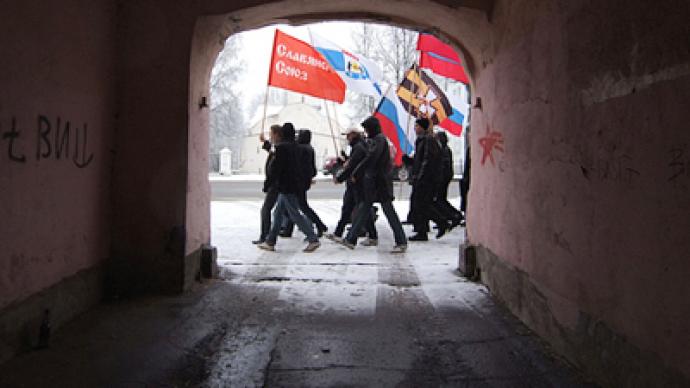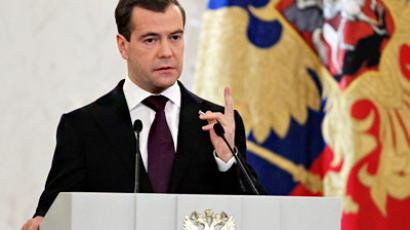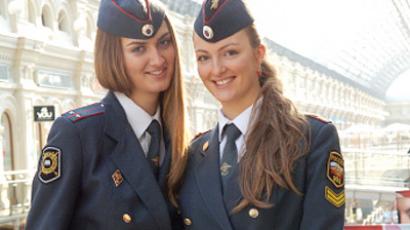Going to extremes: Russia and EU debate rise of nationalism

During regular consultations between Russia and the European Union, delegates from both sides of the political divide have discussed the disturbing rise of racism, nationalism and extremism in Europe and Russia.
"Problems exist everywhere, here in Russia and in Europe," admitted Oleg Malginov, Russian delegation leader and director of the Foreign Ministry's Humanitarian Co-operation Department. "Europe is becoming increasingly right-biased…xenophobia has been growing, not only in an everyday context, but also at the political level.Malginov then alluded to the rise of ultra-nationalist tendencies in various member states of the EU.“Right-wing parties of nationalistic predisposition make their way into EU parliaments and to the European Parliament, and become members of governments. This tendency cannot leave anyone unconcerned," he told Interfax.In France, for example, the ultra-nationalist Front National is predicted to make robust gains in next year’s elections ever since Marine Le Pen took over the leadership of the party from her father, Jean-Marie Le Pen. One recent poll showed that as many as 40 per cent of former supporters of President Nicolas Sarkozy, whose ratings have plummeted ever since he got France involved in military operations in Libya, are attracted to the party’s anti-immigration platform.Meanwhile, faraway Finland exploded on to the political radar with the anti-euro True Finns party, which promises to slash the Scandinavian nation’s dependency on foreign aid, as well as eliminate welfare payments and other perks to immigrants. The party stunned the complacent EU in April when it came in third place with 19 per cent of the electoral vote. Malginov, meanwhile, admitted that Russia was also not free of such dangerous tendencies."We are experiencing the same problem. Neo-fascist groups have been multiplying and ethnic conflicts are becoming increasingly serious," he said.In December, Moscow experienced a massive race riot just outside Red Square. The melee was sparked by the shooting death of a Russian football fan by individuals from Russia’s Caucasus region. The problem of racism, which the Soviet Union tamped down due to its ideology based on a “workers paradise” that tended to disregard or downplay national allegiances, is a new problem for Russia. On a slightly different theme, Malginov said the delegates discussed the supremacy of law. “We spoke in detail about judiciary reform, the reform of the penitentiary system, police reform and the reform of the investigative committee of the Prosecutor General's Office,” he told reporters. “Although all of us want these reforms to go faster and more effectively, we can see that much has been done already, especially at the legislative level."In February, coming on the heels of the race riots, and later by a deadly suicide bombing at Domodedovo International Airport, President Dmitry Medvedev announced a sweeping Police Bill, which came into effect on March 1.In announcing the initiative to reporters, the Russian president promised "tough action against any manifestations of extremism and attempts to incite ethnic and religious hatred.""Extremists must not be given a slightest chance to destabilize the domestic situation,” he added, “particularly when publicly important events take place."This was interpreted as a warning to the Interior Ministry that extra precautions must be taken as Russia prepares to host the Winter Olympic Games in Sochi in 2014 and the FIFA World Cup in 2018. Incidentally, the Moscow City Court on Friday handed down a guilty verdict against ultra-nationalist Nikita Tikhonov for the death of lawyer Stanislav Markelov and reporter Anastasiya Baburova, both of whom were shot in broad daylight in January 2009. Tikhonov was sentenced to life in prison. His girlfriend, Evgeniya Khasis, was found guilty as an accomplice in the crimes and sentenced to 18 years in prison.Meanwhile, the Russian side took the opportunity to inquire as to what the European countries have been doing to protect their citizens from excessive intrusion at the behest of government agencies. Russia said it was concerned, based on recent reports, that European law enforcement agencies and special services, operating under the pretext of “fighting terrorism,” are conducting illegal searches that include searching electronic mail and use of internet without a court warrant, said the director of the Foreign Ministry's Humanitarian Co-operation Department."We also raised other questions that must be answered,” Malginov noted. “The functioning of civil society is a problem which both Russia and Europe have.We discussed our co-operation between international organizations dealing with human rights, as well as the special issue ofchildren's rights." The Russian delegation also expressed its concern that the legal situation for many ethnic Russians in Estonia and Lithuania, many of whom are forced to live in a bureaucratic limbo, being denied formal citizenship by the authorities, remains a serious problem.Consultations between Russia and the European Union have been held two rimes a year since 2005.Robert Bridge, RT














